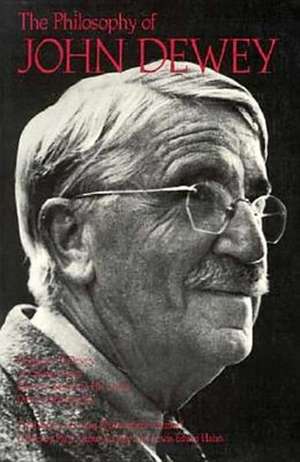The Philosophy of John Dewey, Volume 1: Library of Living Philosophers (Hardcover), cartea 0001
Autor John Dewey, Lewis Edwin Hahn Editat de Paul A. Schlippen Limba Engleză Hardback – 30 sep 1999
Preț: 255.15 lei
Preț vechi: 320.61 lei
-20% Nou
Puncte Express: 383
Preț estimativ în valută:
48.82€ • 53.25$ • 41.17£
48.82€ • 53.25$ • 41.17£
Carte indisponibilă temporar
Doresc să fiu notificat când acest titlu va fi disponibil:
Se trimite...
Preluare comenzi: 021 569.72.76
Specificații
ISBN-13: 9780875481326
ISBN-10: 0875481329
Pagini: 748
Dimensiuni: 162 x 236 x 42 mm
Greutate: 1.2 kg
Ediția:Revised
Editura: Open Court Publishing Company
Seria Library of Living Philosophers (Hardcover)
ISBN-10: 0875481329
Pagini: 748
Dimensiuni: 162 x 236 x 42 mm
Greutate: 1.2 kg
Ediția:Revised
Editura: Open Court Publishing Company
Seria Library of Living Philosophers (Hardcover)
Descriere
In this volume the writings of John Dewey are subjected to careful scrutiny by seventeen great thinkers. Some have eulogized, some have reinterpreted -- but all have respected the work of that great and germinal mind. For thirty years John Dewey has been the most dynamic, arresting figure in American thought. Whereas the "traditional" philosopher too often concerned himself with matters seemingly remote and formalistic, Dewey was ever aware of the ferment of this developing democracy. The problems of every-day life, the "commonplace" in our culture, the direction of the educative process in the schools, the processes of politics, art, literature, science, religion--on all these John Dewey has left the impress of his thought.
It was inevitable that Dewey's writings should raise questions and doubts, that readers should find points of difference and emphasis. Now for the first time Dewey himself is able to read and answer in one place the analysis and criticism of a group of eminent men. The result of this unique situation is the setting for a new type of intellectual experience--an opportunity to sit in a seminar with Dewey and some of the greatest of his critics.
It was inevitable that Dewey's writings should raise questions and doubts, that readers should find points of difference and emphasis. Now for the first time Dewey himself is able to read and answer in one place the analysis and criticism of a group of eminent men. The result of this unique situation is the setting for a new type of intellectual experience--an opportunity to sit in a seminar with Dewey and some of the greatest of his critics.



